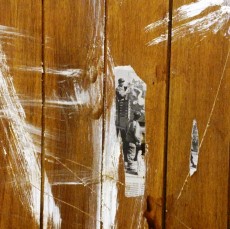Guten Tag, Lieber Feind! is a magical children’s illustrated books exhibition at the
International Youth Library in Munich. Here, ‘I’ and its ‘other’s meet in armed conflicts and their aftermaths in children’s picture books, posters, and artwork from the cardboard shelter set-up for refugees to the newspaper slips which seem to have survived occupation, bombardment, and collective fleeing.
 Otherness is constitutive of the self. ‘I’ exists only in relation to an ‘other’ whose existence borders ‘I’ as a unique entity. However, ‘I’ can be conquered by ego inflation, spatial constraints, fears – real and imaginary – of resource expendability, selfishness, desire to conquer others and bring them closer to self, etc., to the point that by waging war against its other(s), ‘I’ endangers its own very existence and disrupts its own surroundings too (Warum, by Nikolai Popov, 1995). Historically, wars happen at the urging of ‘I’s in power, perhaps to re-define their selfs’ identity, to come up with new more tolerable ‘others,’ or in the naïve hope of building a world of ‘I’s in which no ‘other’ exists or where all ‘others’ are subordinated to ‘I’ or likened to it (Frosch und der Fremde, by Max Velthuijs, 1993, and Fremmed, by Kaia, Benedikt, and Trond Brænne, 2010).
Otherness is constitutive of the self. ‘I’ exists only in relation to an ‘other’ whose existence borders ‘I’ as a unique entity. However, ‘I’ can be conquered by ego inflation, spatial constraints, fears – real and imaginary – of resource expendability, selfishness, desire to conquer others and bring them closer to self, etc., to the point that by waging war against its other(s), ‘I’ endangers its own very existence and disrupts its own surroundings too (Warum, by Nikolai Popov, 1995). Historically, wars happen at the urging of ‘I’s in power, perhaps to re-define their selfs’ identity, to come up with new more tolerable ‘others,’ or in the naïve hope of building a world of ‘I’s in which no ‘other’ exists or where all ‘others’ are subordinated to ‘I’ or likened to it (Frosch und der Fremde, by Max Velthuijs, 1993, and Fremmed, by Kaia, Benedikt, and Trond Brænne, 2010).
Therefore, as much as individual and collective identity is about uniqueness and distancing of ‘I’s from their ‘other’s, both in peace and in triggering wars, it is – ironically – about reproducing the ‘I’ and making the ‘other’ into the image of ‘I,’ in peace and during wars. But the aftermaths of armed conflicts show, time and again, the futility of such narrow-minded existential objectives.
In Farsi ¹, the word for ‘enemy’ is a compound noun which, if translated literally, means ‘against-I,’ or in common vocabulary, the ‘other’ of ‘I.’ Beyond any linguistic borders, however, this exhibition – as I understand it – is a universal invitation to all the ‘I’s to greet their ‘against-I’s, their ‘others,’ their enemies, to greet them ‘Guten Tag!’, to understand them, to respect them, and to try to get to know them better. For no ‘I’ can ever exist unless it is surrounded by its ‘other’s.
These are the themes examined in the books, posters, and artwork on display at Guten Tag, Lieber Feind. As said above, the exhibition’s conclusion is not an affirmation of the status quo, but a reprimand, a chastisement of the human lust for otherization, distanciation, and ruin, and an invitation to friendship and acceptance of the ‘other,’ even if for the selfish sake of ‘I’ itself. At the end of the exhibition hall, after all colors are
 consumed in children’s books and colorful posters, there is a vertical black-and-white poster entitled Migrar (by Jose Manuel Mateo and Javier Martinez Pedro, 2011). I find this the best conclusion for the mainly adult visitors of the exhibition to reflect upon what Lieber Feind starts with: an empty dusty luggage in which the hopes of our children are lost to the lust in the world of adults, a luggage not for a family trip, but for the desperate mapless flee of ailed souls. As Antoine de Saint-Exupery has been quoted in the staircase to the attic, “War is no adventure. War is a disease.”
consumed in children’s books and colorful posters, there is a vertical black-and-white poster entitled Migrar (by Jose Manuel Mateo and Javier Martinez Pedro, 2011). I find this the best conclusion for the mainly adult visitors of the exhibition to reflect upon what Lieber Feind starts with: an empty dusty luggage in which the hopes of our children are lost to the lust in the world of adults, a luggage not for a family trip, but for the desperate mapless flee of ailed souls. As Antoine de Saint-Exupery has been quoted in the staircase to the attic, “War is no adventure. War is a disease.”
Mahshid Mayar, Iran/Germany
Fellowship Holder, January 2015
¹ Farsi (or Persian) is the language spoken in Iran, Afghanistan, Tajikstan, and parts of India and China. The word for ‘I’ in Farsi is من / mæn / and the word for ‘enemy’ is دشمن / dʊʃmæn /.

Hat dies auf Displaced H rebloggt und kommentierte:
„I find
this the best conclusion for the mainly adult visitors of the exhibition to reflect upon what Lieber Feind starts with: an empty dusty luggage in which the hopes of our children are lost to the lust in the world of adults, a luggage not for a family trip, but for the desperate mapless flee of ailed souls. As Antoine de Saint-Exupery has been quoted in the staircase to the attic, “War is no adventure. War is a disease.”“